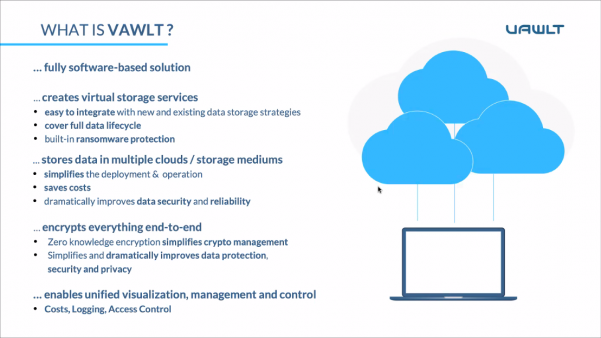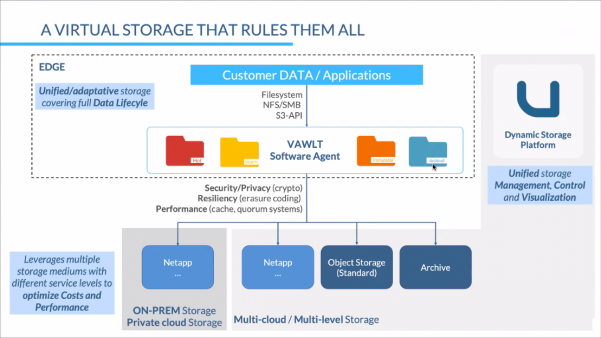Company Profile: Vawlt
Portuguese start-up in data management space
By Philippe Nicolas | March 25, 2022 at 2:02 pmCompany:
Vawlt Technologies, S.A.
HQs:
Tec Labs, Campus da FCUL, Campo Grande 1749-016 Lisbon, Portugal
Date founded:
May 2019
Founders and background:
The start-up was founded by researchers from a prolific R&D group – LaSIGE – within the University of Lisbon.
Ricardo Mendes (CEO) and Tiago Oliveira (CTO) received their Masters of Systems Architecture and Computers Network from that university, specializing in storage, cloud computing and systems’ dependability.
Alysson Bessani (technical advisor) is a recognized expert in systems’ dependability and distributed systems. He also excels in the subjects of cybersecurity and blockchain. He is an Associate Professor of the Department of Informatics of the Faculty of Sciences of the University of Lisbon and the president of the LaSIGE research center.
Mendes and Olivera, together with Alysson, developed all the technology behind the company. They started working at the technology behind Vawlt in 2009, which gave birth to the commercial product later on.
The vision and the belief that everyone is entitled to control and decide the destiny of their own data were the motivation and fuel for studying several matters related to data security, distributed trust, dependability, and data sovereignty.
Financial funding:
The company started its activity after closing its first investment round with the number ≠1 VC in Portugal: Armilar Venture Partners. The first goal was to turn the existing technology into a product and start the product-market fit. At the end of 2020, the team closed an extension to this round where Shilling Capital Partners and Accel (through its’ scout program) joined, together with 2 former executives of multinational companies as private investors.
In total, Vawlt raised around $1 million (€875,000).
Employees numbers:
9
Product/Technology:
Vawlt is an all-in-one multicloud data storage-as-a-service solution that simplifies the transition to the cloud, improves data security standards and optimizes usage of storage resources.
It enables the creation of virtual storage services adapted to customers’ specs, which are easy to integrate with both new and existing data storage strategies. In addition, the data are stored in multiple cloud providers simultaneously, granting new increased levels of security, reliability, and resilience.
Users can create several virtual storage volumes and select their types, adjusted to different data lifecycles, select the cloud providers they want to work with, as well as the geographical locations from the data centers, and several other configurations, such as the size in terabyte or the storage interfaces (such as Filesystem or S3-API).
Vawlt’s product provides:
- a centralized web-based Dynamic Storage Platform where users can create storage volumes according to their needs and define the volume types, their configuration, and select where their data is stored;
- the software agent that creates the data-centric virtual storage services, and where the data plane is seamlessly mounted.
Vawlt has several differentiating technological concepts to be taken into consideration:
- The cloud-of-clouds concept, or distributed storage in which all data is seamlessly encrypted, split into segments, and stored in multiple cloud providers simultaneously, abstracting their heterogeneity, availability, or performance from the applications.
- It provides cloud-scale (Byzantine) fault-tolerance – any 2 segments from the original file can be used to retrieve the original data, which means that data is available and secure even if one of the clouds is down, if they lose or corrupt the data, or even if they have been compromised.
- The data-centric architecture enables the data to travel directly between the software agent deployed at the client machines and the storage clouds without going through company’s servers. This promotes the data-plane independence in terms of performance and data availability even from the service.
- The proprietary zero-knowledge end-to-end encryption protocol ensures that only the owner has access to file content for complete privacy (Improved Data Security).
All these technological features of Vawlt address 4 main limitations for cloud computing for storage:
- Availability: When data is moved from the company’s network to an external data center, data availability is inevitably affected by problems on the network. Cloud outages or denial-of-service attacks can also affect access to the data.
- Data loss or corruption: Byzantine fault-tolerant replication to store data on several cloud services, allowing data to be retrieved correctly even if some clouds corrupt or lose it.
- Privacy: by default, cloud providers have access to both the stored data and how it is accessed. Even if we assume the providers are trustworthy, malicious insiders are a widespread security problem, and this is a concern, especially with critical data.
- Vendor lock-in: The concern that the coupling between the customer and the provider becomes so high to a point that it becomes economically not viable to move from one provider to another.
Release and Roadmap:
- Current release 2.1.3 (March 2022)
- Features:
- Tailored data volumes and interfaces, according to the users’ needs
- Choose the cloud providers to work with
- Select the geographical locations where data is stored
- Security: Zero-knowledge encryption
- Fault-tolerance: ensure data is available at all times, even if one of the cloud providers is unavailable or has been compromised
- Roadmap:
- More public cloud providers, new integrations, and different storage interfaces
- Active Directory integration
Pricing model:
Any virtual storage volume created through the platform has an associated price. The volume prices vary depending on known and easy-to-follow factors, such as the volume type, the selected cloud providers, the storage interfaces, and the download quota. Users can see the volume price when they complete the configuration. The minimum size for any storage volume is 1TB.
The “pay-as-you-grow” model assures cost control on the storage infrastructure.
Administrators can use all cloud providers aligned with pools, or add their cloud accounts – AWS or Azure – and use them to create new volumes, or add their on-premise nodes via SMB or S3-API. All this is free of charge.
Vawlt has several Volume Types adjusted to different data lifecycle stages:
- Hot Volumes (best for recurrent storage and sharing): Starting at €30,90/TB/month
- Warm Volumes (optimized for storage of editable data, accessed less frequently): Starting at €16,90/TB/month
- Immutable Volumes (best for files that don’t require changes upon storage): Starting at €15,90/TB/month
- Archival Volumes (best for files that are stored for long periods of time and rarely read): Starting at €7,90/TB/month
These starting prices include at least one “top-tier” cloud provider (eg. AWS, Azure, Google Cloud, or IBM).
Customers and VARs:
Vawlt started selling the product in 2Q21 and since then customers base are increasing at a high pace from customers of different sizes, sectors (e.g. banking, healthcare, industry, etc.). In terms of geographies, the company is already taking first steps outside Europe, namely in Brazil. They have strategic partnerships established with a telco, a distributor, and several VARs that take the product to their “general-purpose” customers, while direct sales focus on specific sectors like financial services and healthcare.
Workloads/Use cases/Applications:
- Backup storage offsite for disaster recovery
- Freeing up infrastructure resources
- Cloud enabler for legacy applications
- Secure cloud gateway
Comments
The Portuguese software company, the only storage start-up in Portugal as far as we know, gave us recently the opportunity to dig into their product and market strategy. It stayed below the radar for more than 10 years designing and developing the product.
It develops a data management software that participate in the cost control of the storage infrastructure by placing data on the right location, on-premises or in the cloud, while preserving a transparent access to all these controlled data. Here we speak about unstructured data.

Residing in the data path each VM operates as a data server connected to back-end devices or cloud storage services. All data is encrypted end-to-end and the environment is managed by a central administration console thus controlling all deployed agents. Data sent to targets are chunked and engineering team imagined a 2+1 data protection scheme. The software agent, probably not the right term, in fact a virtual storage server, exposes data via multiple access methods such as NFS, SMB, S3, FTP, etc. The core notion here is the volume which groups its data temperature, storage providers and location, size, price and interfaces.

Backup, DR and security are built-in as these agents create implicitly these services.
We understand that the product doesn't provide data movement policies yet when data are already stored. It belongs to the routing and access product category and we expect this data movement and mobility to be added soon.
This is a well populated market segment with well known and established vendors and also small emerging ones confirming if needed the dynamism of the domain and the need for innovative approaches. Among usual suspects, hot companies and alternatives ones, we can list various players having several overlaps among Arcitecta, Atempo, Congruity 360, CTera Networks, Data Dynamics, Datadobi, DefendX, Dell, Grau Data, Hammerspace, IBM, Komprise, Moonwalk, Nasuni, NetApp, Nodeum, Panzura, Point Software and Systems, QStar, Quantum, Spectra Logic, StrongBox Data Solutions, Tiger Technology or Versity













 Subscribe to our free daily newsletter
Subscribe to our free daily newsletter

